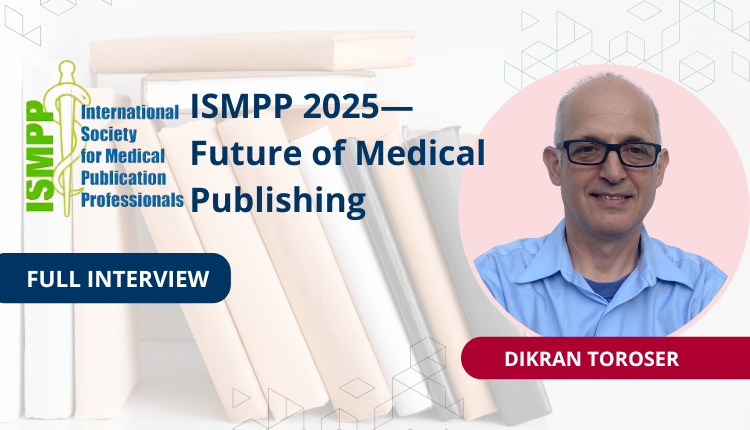The 21st Annual Meeting of the International Society for Medical Publication Professionals (ISMPP) took place at the Grand Hyatt Washington in DC, from May 11th to May 14th, 2025. The event, centered around the theme “Diversity & Innovation: In Concert,” brought together a vibrant community of professionals from across the medical communications field. This Q&A with Dikran Toroser, an industry stalwart, reflects on the key discussions and insights shared during the meeting, highlighting the themes that are shaping the future of medical publishing.
From the increasing importance of diversity and innovation to the evolving role of patient engagement and the potential of AI, we explored how our field is adapting to meet new challenges. We also delved into the growing role of publications, the ongoing progress of plain language summaries (PLS), and the challenges related to maintaining integrity and trust in scientific publishing. Through this conversation, we share reflections on our collective commitment to advancing medical communications, emphasizing the need for collaboration, ethical practices, and patient-centered approaches as we look to the future. Additionally, we discuss the experience of presenting research on the implementation of GPP 2022 guidelines, celebrating the progress we’ve made, and the conversations sparked at ISMPP 2025.
ISMPP-2025 Meeting Summary: A Q&A from Dikran Toroser’s Perspective
What were the key themes of the ISMPP-2025 meeting?
The meeting focused on a few crucial themes that directly impact our profession in medical communications. A major takeaway was the shared responsibility to connect science to people with clarity, accuracy, and compassion. The meeting also highlighted the importance of diversity and innovation. These two elements were emphasized as essential for creating better innovative solutions for patient care and fostering trust in science. Additionally, we discussed how the role of medical communications is rapidly shifting, with an increased focus on integrating patient engagement throughout the research and publication process.

Why was diversity such a big focus during the event?
Diversity was a core theme because it’s vital for sparking innovation. When we bring together people with different backgrounds, expertise, and life experiences, it leads to creative solutions that improve patient care and strengthen trust in science. Embracing diversity is necessary if we want to keep driving progress in medical communications.
How is the role of publications evolving in the medical communications field?
The role of publications is changing. We’re moving from traditional publications toward more integrated communication strategies, where patient engagement and partnership is at the forefront. Patients aren’t just passive recipients of information anymore—they are becoming essential partners in the research and publication process. This shift ensures that what we communicate is more relevant and empathetic to patients’ real-world concerns.
What progress has been made in plain language summaries (PLS), and where do improvements still need to be made?
While there has been substantial progress in creating plain language summaries (PLS), many pivotal clinical studies still lack accessible summaries for non-specialists. The GPP 2022 Call to Action made an impact, but there’s still a lot more work to do. We need to make sure that PLS are consistently created, easily discoverable, and tailored for diverse audiences. Greater clarity, consensus, and technological innovation are required to make PLS a standard in scientific publishing, improving both equity and health literacy.
What challenges related to integrity and trust in scientific publishing were addressed at the meeting?
The meeting raised important concerns about the increasing number of retractions, paper mills, and predatory publishing. We were all encouraged to be vigilant, educate ourselves, and flag suspicious practices when we encounter them. Collaboration across publishers, editors, and institutions is essential to maintaining trust and integrity in scientific communication.
What role did AI play in the discussions, and what was the consensus?
AI continues to play a major and rapidly increasing role in the discussions, especially regarding its potential to transform medical writing. Workshops and keynotes touched on how AI can assist with prompt engineering and the agentic framework. However, the consensus was that while AI is a powerful tool, we cannot lose sight of the need for human oversight. Ethical standards and quality control must always guide our work. As we move forward, it’s important that we adapt our guidelines and best practices to ensure AI enhances, rather than undermines, what we do. Considerations around copyright are also becoming significant when considering AI use.

How was the community recognized during the meeting?
The meeting took time to recognize and celebrate the amazing work happening in the medical communications community. Awards were given to individuals and teams who have made outstanding contributions to accessibility, innovation, and global best practices. There was also a strong focus on supporting the next generation of professionals and encouraging diversity across all regions, roles, and backgrounds.
What were your final reflections on the meeting, Dikran?
From my perspective, ISMPP-2025 truly showcased the resilience of the medical communications profession and its commitment to meaningful progress. The meeting reinforced that diversity, collaboration, and a patient-centered approach are not just ideals but essential to shaping the future of our field. As we face rapid changes driven by technology and shifting societal needs, we must stay true to our mission, remain ethically grounded, and continue to focus on connecting science to the people it’s meant to serve.
How was your experience presenting the poster at ISMPP 2025?
It was a real honor and pleasure to present our research on the implementation of GPP 2022 at the ISMPP 2025 Annual Congress. I had the opportunity to present on behalf of my wonderful coauthors—Raghuraj Puthige, PhD, eMDP, Anisha Mehra, PhD, CMPP, Dr. Dhanya Mukundan, MDS, CMPP™, and Dr. Anupama Kapadia. Our work aimed to assess awareness and implementation of the GPP 2022 guidelines, identify pain points, and support broader uptake and application. The response was extremely positive, and it was great to engage with peers who are as passionate about advancing medical communications as we are.

Overall, ISMPP 2025 Annual Meeting has been an excellent congress, and I am looking forward to the next one already!
Author:
 Dr. Anupama Kapadia
Dr. Anupama Kapadia
General Manager, Enago Life Sciences
Connect with Anupama on LinkedIn

